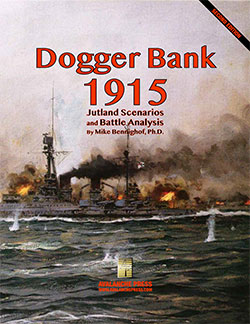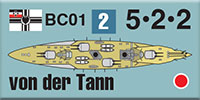Jutland: North Sea 1914
Jutland: Dogger Bank 1915
Publisher’s Preview
by Mike Bennighof, Ph.D.
January 2024
 Avalanche Press is unusual among wargame companies, a creator-owned outfit. That means that when I have an idea, whether it’s good or not, I have the ability to turn it into reality. Or at least try to do that. Avalanche Press is unusual among wargame companies, a creator-owned outfit. That means that when I have an idea, whether it’s good or not, I have the ability to turn it into reality. Or at least try to do that.
I was close to wrapping up the Second Edition of Great War at Sea: Jutland, our best-selling wargame ever, when I grew dis-satisfied with it. the game had plenty of fun scenarios and it covered a broad scope of history, and that latter point was the problem. I found myself wanting to zero in tightly on the 1916 Battle of Jutland itself, to the exclusion of operations and battles that took place before and after the big clash of dreadnoughts. Rather than touch on many naval operations superficially, the game would dive into the battle from which it took its name. We could explore the planning of the battle by both sides, and provide scenarios based on those plans, so players could try them out. We could include scenarios that broke down the action at key moments. And then we could look at how both sides reacted after the battle, their contingency plans for how they would react if the other side made an insane attempt to enter the North Sea again despite widespread damage to key ships.
So we did that. And I’m very happy with the result, and think that Jutland Second Edition justifies the risk we took in completely rebuilding a best-selling game. It’s the type of game I want to publish: a blend of history and game-play that uses the game elements to help tell the story of the historical event.
Beyond my lack of any other useful skills, I design and publish historical wargames because of the history, as an excuse to study and write history without the burdens of the academic establishment (that is, I don’t have to kiss the department chairman’s ring, or flirt with his secretary to induce a few “mistakes” in the teaching schedule – I was really bad at the first of those, pretty good at the second). And so I like to include as much history as we can wedge into in the games, both within their structure and as background text.
 Jutland’s Second Edition follows the framework I’ve come to prefer for both our naval and tactical games: the story’s laid out in a series of chapters, with historical text, operational scenarios (the ones that take place on the operational map, where fleets try to find or elude one another) and battle scenarios (the ones that take place on the Naval Tactical Map, where ships fight each other with guns and torpedoes). Every operational scenario is accompanied by at least one battle scenario, showing the combat that arose, or could have arisen, from that operation. The more involved operations are broken into several operational scenarios, usually one covering the whole operation and then a few more picking up the action at crucial inflection points, so that you, the player, can make the big decisions. Jutland’s Second Edition follows the framework I’ve come to prefer for both our naval and tactical games: the story’s laid out in a series of chapters, with historical text, operational scenarios (the ones that take place on the operational map, where fleets try to find or elude one another) and battle scenarios (the ones that take place on the Naval Tactical Map, where ships fight each other with guns and torpedoes). Every operational scenario is accompanied by at least one battle scenario, showing the combat that arose, or could have arisen, from that operation. The more involved operations are broken into several operational scenarios, usually one covering the whole operation and then a few more picking up the action at crucial inflection points, so that you, the player, can make the big decisions.
While it doesn’t take a great deal of time to play a Great War at Sea scenario, whether of the operational or the battle variety, there’s no guarantee that an operational scenario will lead to any battles at all, or that those which do arise will be interesting or fun to play. Battle scenarios let you get right to the action, to put those battleships on those blue hexagons and open fire. No need to stare at the fleet markers on the operational map, hoping that their paths will cross so you’ll get to fight somebody. You can skip all of that and get right to the fighting.
Jutland, the game, includes many more ships than just those involved at the Battle of Jutland (though the Jutland-involved ships are the vast majority, since Jutland was a really, really big battle). And that’s the basis for Jutland: North Sea 1914, a book of history and analysis, and its sequel, Jutland: Dogger Bank 1915. Taken together, they offer a thorough investigation of naval combat in the North Sea between August 1914 and March 1915, with 75 scenarios between them (29 operational and 46 battle scenarios). That’s on top of the 22 scenarios in the core game, Jutland - 97 total for the game plus the two history/analysis books.
Will you ever play 97 scenarios? Well, maybe! You could, they’re all right there waiting for you, and all of them play out very smoothly. The Second Edition rules are built for ease of play, and they’re the same rules used in every Great War at Sea game - once you know how to play one of them, you know how to play them all.
There’s a dirty little secret about tabletop games (that includes both wargames and role-playing games): most of them are read for entertainment, rather than played. That’s been well-established within the game industry. What we’ve crafted with North Sea 1914 and Dogger Bank 1915 are a pair of books that you can read and enjoy even if you never break out the game to play a single one of the scenarios - you can use the scenarios to follow the story and see exactly what each side faced.
What you’ll notice fairly quickly is that the German High Seas Fleet commander in the first six months of the war, Friedrich von Ingenohl, has been badly treated in the historiography of the North Sea campaign. The Germans are out-numbered and out-gunned, generally slower than the British, and the Kaiser has commanded that a cluster of ancient garbage scows armored with tin foil and armed with popguns must accompany the fleet. Even when the floating targets are eventually left at home, the German task is far tougher than simply growing a pair and steaming out for manly combat.
Yet the Germans kept going to sea, seeking a situation where they could match all of their combat strength against just part of the British Grand Fleet. And the British, following the Churchill concept of economy of force, presented some of these opportunities - if the Germans could catch them at just the right moment.

While Jutland, the game, is focused on Jutland, the battle, we focused North Sea 1914 and Dogger Bank 1915 on the other battles and operations you might have heard about: the Scarborough Raid (German battle cruisers shell English beach vacation homes), the Battle of Helgoland Bight (British battle cruisers shoot up German offshore patrols) or the Battle of Dogger Bank (German and British battle cruisers clash in the middle of the North Sea). We also get to play with some variations, like giving the Germans the battle cruiser Von der Tann at Dogger Bank in place of the armored cruiser Blücher, or keeping the battle cruiser Goeben at home instead of sending her to the Mediterranean.
The fleets did not go to sea often, but the North Sea was very small. It’s actually surprising that only one major fleet battle took place during the war, and one smaller battle cruiser engagement. The opportunities were certainly there for other battles, and at times only narrowly missed. So we take a look at what might have happened had they not missed one another.
That also gives more balanced play opportunities, with more or less equal fleets meeting on the Tactical Map. Good game development can make a competitive game out of almost any situation, but it’s certainly more satisfying when you can look at the game board and know who won without having to consult the scenario book to be sure. When you’re tweaking history anyway, you should tweak it to make the best game situation (at least a few times; otherwise, you play the hand history dealt you).
Eventually, I intend to cover the entire North Sea campaign, and the one in the Baltic Sea, with this sort of history and analysis and scads of scenarios. It’s an ambitious and possibly insane plan, but this is why I design, write and publish wargames.
You can order North Sea 1914 right here.
You can order Jutland: Dogger Bank right here.
The Jutland Experience
 Jutland Second Edition (full game) Jutland Second Edition (full game)
Jutland: North Sea 1914
Jutland: Dogger Bank
Journal No. 46: Iron Dogs
Retail Price: $179.96
Package Price: $150.00
Gold Club Price: $120.00
You can order the Jutland Experience right here.
Sign up for our newsletter right here. Your info will never be sold or transferred; we'll just use it to update you on new games and new offers.
Mike Bennighof is president of Avalanche Press and holds a doctorate in history from Emory University. A Fulbright Scholar and NASA Journalist in Space finalist, he has published a great many books, games and articles on historical subjects; people are saying that some of them are actually good.
He lives in Birmingham, Alabama with his wife, three children, and his new puppy. His Iron Dog, Leopold, could swim very well.
Want to keep Daily Content free of third-party ads? You can send us some love (and cash) through this link right here.
|
